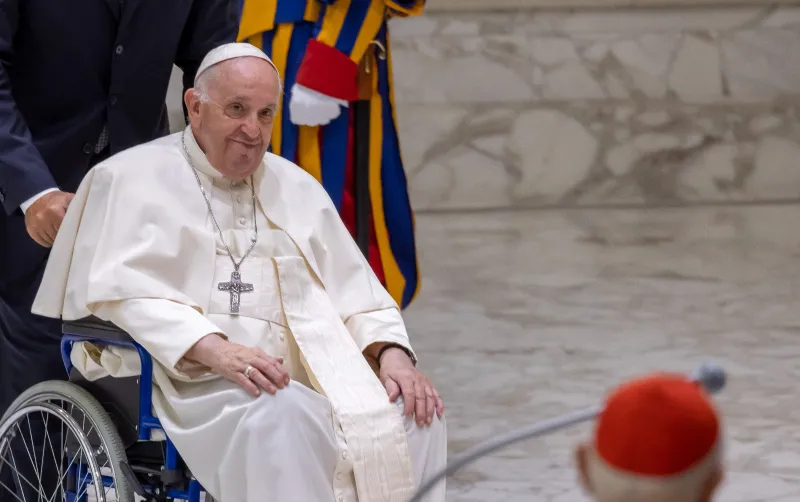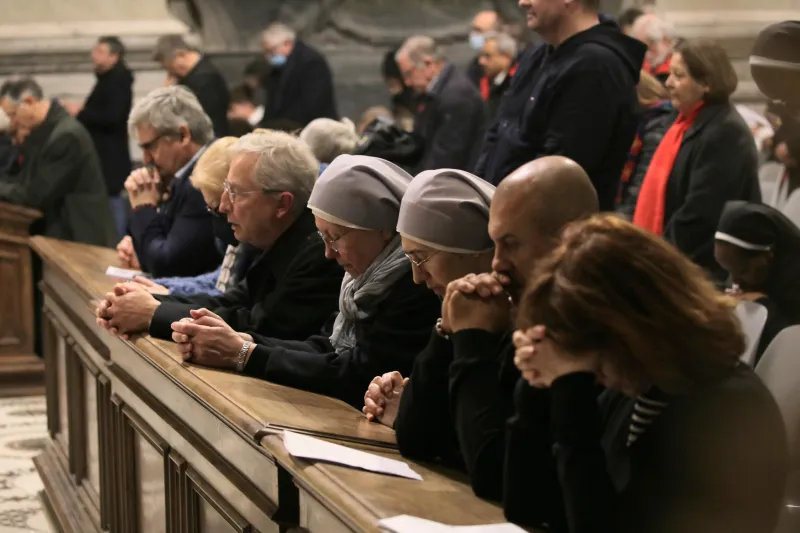 U.S. Vice President Kamala Harris speaks to reporters after meeting with Israeli Prime Minister Benjamin Netanyahu in the Vice President’s ceremonial office in the Eisenhower Executive Office Building on July 25, 2024, Washington, D.C. / Credit: Kenny Holston-Pool/Getty Images
U.S. Vice President Kamala Harris speaks to reporters after meeting with Israeli Prime Minister Benjamin Netanyahu in the Vice President’s ceremonial office in the Eisenhower Executive Office Building on July 25, 2024, Washington, D.C. / Credit: Kenny Holston-Pool/Getty Images
Washington, D.C. Newsroom, Jul 26, 2024 / 10:05 am (CNA).
Here’s a roundup of pro-life-related developments in the U.S. this week.
Harris pledges to codify Roe in federal law
Since replacing President Joe Biden as the presumptive presidential nominee for the Democratic party, Vice President Kamala Harris has already made abortion a major focus of her campaign, pledging in several speeches to codify Roe v. Wade into federal law.
In a Wednesday night speech in Indianapolis, Harris bashed former President Donald Trump for nominating three Supreme Court justices who voted to overturn Roe.
“When I am president of the United States and when Congress passes a law to restore those freedoms, I will sign it into law,” she said.
“We who believe in reproductive freedom will fight for a woman’s right to choose,” said Harris, “because one does not have to abandon their faith or deeply held beliefs to agree that the government should not be telling her what to do.”
Harris has used this line repeatedly during her “Fight for Reproductive Freedoms Tour” in which she slammed states with pro-life laws as “immoral” and advocated for a national pro-abortion law.
Iowa heartbeat law to take effect July 29
Iowa District Judge Jeffrey Farrell lifted a block on the state’s six-week pro-life law, clearing the path for the measure to finally take effect on July 29.
The Iowa “heartbeat” law was passed by the legislature in 2023. It protects unborn life from abortion once a baby’s heartbeat is detectable, which is typically around six weeks.
Planned Parenthood and several other abortion groups launched a lawsuit over the law and it was blocked by a district court shortly after passage. Polk County District Judge Joseph Seidlin ruled in 2023 that the law was likely invalid because it imposed an “undue burden” on abortion.
The Iowa Supreme Court, however, ruled on June 28 that the law is likely not unconstitutional because abortion is “not a fundamental right under the Iowa Constitution.” The high court returned the case to lower courts for further deliberation.
Commending the state supreme court’s ruling, Iowa’s Catholic bishops said: “For us, this is a question of the common good and human dignity. Human life is precious and should be protected in our laws to the greatest extent possible.”
Arkansas Supreme Court rules on abortion petition
The Arkansas Supreme Court ordered that signatures as part of an abortion ballot initiative be counted after Secretary of State John Thurston said the documentation was improperly submitted.
This comes after Thurston denied abortion advocates their petition to add a broad pro-abortion amendment to the November ballot. The prosecutor said the activists failed to identify their paid canvassers or to indicate that the canvassers had followed state law regarding gathering signatures.
The state high court’s decision issued on Tuesday ordered Thurston to resume counting petition signatures gathered by volunteers by July 29.
The group claimed to have gathered over 100,000 signatures — well over the 90,700 required to add an amendment proposal to the ballot. Thurston, however, said that after subtracting the signatures allegedly invalidly obtained by paid canvassers, the group only had 87,382 signatures, more than 3,000 short of the minimum required.
The Arkansas Supreme Court ruled that the petition’s signatures could be counted but only those not gathered by paid canvassers, meaning the petition may fail to reach the necessary threshold for the November ballot.
Currently, Arkansas protects unborn life beginning at conception, only allowing abortion in cases in which the mother’s life is in danger.
If successfully passed, the abortion amendment would mandate that the state not “prohibit, penalize, delay, or restrict” abortion before 18 weeks of pregnancy. The amendment would further prohibit the state from restricting abortion at all stages in cases of rape, incest, fetal anomaly, or health of the mother.
Federal court denies effort to restrict abortion pill
The Ninth Circuit Court of Appeals denied an appeal by seven Republican-led states to challenge the federal government’s recent loosening of restrictions on mifepristone, the pill that accounts for over 60% of all U.S. abortions.
The seven Republican states — Idaho, Iowa, Montana, Nebraska, South Carolina, Texas, and Utah — argued that the federal government’s loosening of mifepristone restrictions, such as allowing mail-order abortions and prescriptions via telemedicine, undermines their pro-life laws and harms women in their jurisdictions.
The states claimed they had standing to sue because the increase in women needing medical care after unsupervised chemical abortions would result in increased Medicaid expenses.
The 3-0 decision issued by a panel from the Ninth Circuit Court on Wednesday, however, denied the states had standing and dismissed their challenge.
The circuit court’s ruling cited the June 13 AHM v. FDA Supreme Court decision that unanimously rejected an attempt to impose stricter regulations on mifepristone because the doctors bringing the challenge lacked standing.
This comes as a coalition of seventeen Democrat-led states and the District of Columbia are suing to block any further efforts to restrict mifepristone.
Lawsuit by Texas woman wrongly imprisoned for abortion proceeds
U.S. District Judge Drew Tipton this week denied several requests to dismiss a lawsuit brought by a Texas woman who was wrongly imprisoned over her abortion.
The woman, Lizelle Gonzalez, was improperly jailed for murder by the county sheriff for three days in 2022. She was dismissed after the county found the charges were unfounded.
Texas law protects unborn life from conception. However, the law explicitly states that pregnant mothers cannot be prosecuted for their abortions.
Gonzalez is now seeking $1 million in damages from Starr County, which is in south Texas on the U.S.-Mexico border.
[…]








To avoid criticism among Catholics, he will, on rare occasion, allow his moodiness shift towards his distaste for abortion and make the stupid, insensitive to troubled women, hitman statement. But he’ll never forcefully call upon the whole world for its total elimination. That might cause him to lose face with global elitists and their lapdogs in the media.
“Morally inadmissible,” but also still admissibly moral(!). Just thinkin’, now, about the prisoner whom St. Therese prayed for conversion, and how he did convert and kissed the crucifix moments before losing his head to the guillotine. So, maybe conversion is sometimes about timing and certainty: “Depend upon it, sir, when a man knows he is to be hanged in a fortnight, it concentrates his mind wonderfully” (Samuel Johnson).
“And in the light of the Gospel, the death penalty is unacceptable. The commandment, ‘Thou shalt not kill,’ refers to both the innocent and the guilty.”
Really?
Where was the Holy Spirit for the last twenty centuries in regard to this if only now this papacy has the ‘truth’. Christ promised that the Third Person would guide His Church in all truth. It took all these centuries for this to evolve for the ‘inadmissible’ claim under the gravity of death?
Christ upheld the Mosaic Law which included capital punishment. If the original Commandment had said, ‘Thou shall not kill’, even accidents, war, and self defense would be in violation as such a literal declaration did not provide exceptions.
The God of the Old Testament would indict even Himself with all the killing in that period often directed at the behest of the Almighty.
Murder and killing.
Feser and Bessette handily defeated that professor and his ilk, cheerleaders for all things Francis, who refused to acknowledge the difference.
This works for me but I have to believe that there may be rare exceptions where capital punishment may be the only way to protect society.
If we distrust the secular state in smaller matters we should distrust it also in greater things like the power of life and death. Outside of self defense, our lives should be in the hands of God, not the government.
SO according to Pope Francis, the Bible, Tradition, all the Church Fathers, all the Doctors of the Church, and all 265 previous Popes got it wrong on the death penalty, but somehow he got it right. That is pure narcissism not based on authentic Catholic moral theology.
When St. Pope John Paul II rendered the need for the death penalty “very rare, if not practically non-existent” (Evangelium Vitae, 1995, n.57; or now morally “inadmissible” but still admissibly moral), this guidance served largely as a segue to the immediately following section (surely intended to all of the members of the European Union which prohibits the death penalty but then permits abortion):
“If such great care must be taken to respect every life, even that of criminals and unjust aggressors, the commandment “You shall not kill” has absolute value [!] when it refers to the INNOCENT PERSON [italics]. And all the more so in the case of weak and defenseless human beings, who find their ultimate defence against the arrogance and caprice of others only in the absolute binding force of God’s commandment” (n. 58).
And, yet, in the United States we now have duplicitous clericalists (e.g. Cardinal McElroy) pontificating, instead, that sacrilege against the Eucharistic Presence, by notorious Aztecs, should not be a “litmus test” preventing their indiscriminate participation in the Church’s sacramental life.
The Big Picture, in our fallen world, is that elimination of the death penalty would foster a much broader culture of life for everyone, such as the unborn as noted by Pope St. John Paul II (my above comment). But, when he added the words “very rare,” perhaps he also had an intuition about other kinds of situations–such as a later case in a maximum-security prison in Washington State…
A prison guard was murdered by a prisoner already serving a life sentence. What disincentive, or further penalty for outcomes like this? Only sequential or concurrent life terms?
If the death penalty is totally disallowed as a disincentive for homicides and mass shootings in the general population, then perhaps the penalty at least can remain on the books for the protection of prison guards or other prisoners? (Perhaps a footnote in the next edition of the amended Catechism!)
The Catholic Church & The Death Penalty
8 Factual Errors: 2018 CCC 2267 amendment
https://prodpinnc.blogspot.com/2022/02/7-factual-errors-2018-ccc-2267-amendment.html